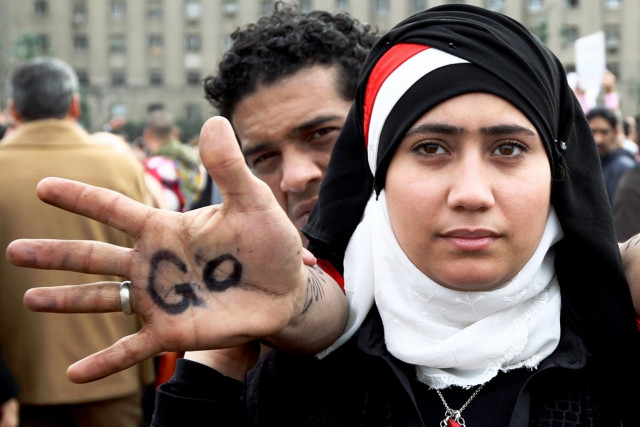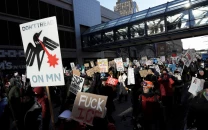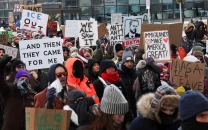'Mubarak should go by Friday'
Hundreds of thousands join Egypt day of anger; ElBaradei says Mubarak has until the end of the week to leave.

Mohamed ElBaradei, who is emerging as a leader of anti-regime protests said Friday had been set as "departure day" for Mubarak.
He told the Al-Arabiya satellite channel that Mubarak should go by Friday.
"What I have heard (from protesters) is that they want this to end, if not today (Tuesday), then by Friday maximum," he said, adding that the Egyptians have marked Friday as "departure day."
"I hope President Mubarak goes before this and leaves the country after 30 years of rule... I don't think he wants to see more blood."
Massive tides of protesters flooded Cairo and Egypt's second city Alexandria today for the biggest outpouring of anger yet in their relentless drive to oust President Hosni Mubarak's regime.
Several hundred thousand demonstrators massed in Cairo's Tahrir square protest epicentre for a "march of a million" set for the capital while similar numbers turned out in Alexandria, AFP reporters said.
As foreign governments scrambled to evacuate their nationals, the opposition said it would not negotiate with Mubarak.
The angry revolt in Egypt, in which an estimated 300 people have died, sent jitters through the region, with Jordan's king Abdullah II Tuesday sacking the government of Samir Rifai after weeks of opposition protests demanding change.
A committee of Egyptian opposition groups, which includes ElBaradei and the powerful Muslim Brotherhood, pledged there would be no negotiations with the regime until Mubarak "leaves," a statement said.
Protesters, including men women and children, swarmed Cairo's streets from early morning, joining hundreds who had spent the night on the square in tents or just sleeping on the grass, unbowed by the presence of troops and tanks.
The army, which has said it will not shoot at protesters, checked IDs and searched protesters before allowing them into the square. Civilians then checked IDs again, fearing plain-clothes police acting as agents provocateurs.
"I will stay here till I die," said a defiant Osama Allam.
"If I die now my whole family will be proud of me. This is what the Egyptian people need," said the 43-year-old lawyer, an effigy of veteran Mubarak hanging from nearby traffic lights, "Off with your head" daubed on his face.
"Freedom or death!" shouted Tarek Shabassi. "I'm ready to stay here 10, 20, 30 years. Dying means nothing to me because I've been dead for 30 years, since Mubarak came to power."
UN High Commissioner for Human Rights Navi Pillay said in Geneva on Tuesday that according to unconfirmed reports, a total of 300 people have died in the anti-government unrest, with casualties "mounting on a daily basis."
In Alexandria, a vast crowd of smiling protesters massed in a light-hearted atmosphere in front of Qaed Ibrahim mosque near El-Raml station in the Mediterranean port before marching off down the corniche, an AFP correspondent said.
Many demonstrators waved Egyptian flags, including one scrawled with "Get out you scum, go be with Zine El Abidine', in reference to Tunisian strongman Zine El Abidine Ben Ali, forced into exile by popular protests last month.
Nearby a group of angry protesters carried Mubarak's symbolic coffin, shouting "Mubarak is dead without God's mercy."
Too little too late
In a bid to stem the burgeoning crisis, Mubarak announced a new cabinet that saw the demise of a widely feared interior minister, and his newly appointed vice president offered talks with the opposition.
But protest organisers denounced the moves as too little too late and announced an indefinite general strike, upping the pressure on Mubarak, in power for 30 years and facing the greatest ever challenge to his presidency.
It was hard to assess the immediate impact of the strike call, with many businesses closed over security concerns or because people were demonstrating.
While the police reaction to the strike and marches remains unknown, the military stated clearly it would not confront the demonstrators.
"To the great people of Egypt, your armed forces, acknowledging the legitimate rights of the people," stress that "they have not and will not use force against the Egyptian people," it said in a statement.
An increasingly embattled Mubarak has appointed his first-ever vice president and a new premier in a desperate attempt to cling to power.
A new cabinet unveiled on Monday did little to placate the protesters, but the departure of interior minister Habib al-Adly, whose notorious security forces have been accused of systematic human rights violations, was welcomed.
Human Rights Watch said in a report released on Tuesday that anger against routine police abuse and torture has been a driving force behind the protests.
"The Egyptian government's foul record on this issue is a huge part of what is still bringing crowds onto the streets today," Joe Stork, the US-based group's Middle East and North Africa deputy director, said in a statement.
Vice President Omar Suleiman said Mubarak had tasked him "with opening immediate talks with the political forces to begin a dialogue around all the issues concerning constitutional and legislative reforms."
But with opposition groups saying they would not do so until Mubarak goes, there looked little likelihood of an early negotiated end to the uprising.
President Barack Obama has called for "an orderly transition to a government that is responsive to the aspirations of the Egyptian people."
Washington's top US senator for foreign affairs said on Tuesday Mubarak should address his nation, a key ally of the United States, and promise that neither he nor his son Gamal will run in upcoming elections.
"It is not enough for President Mubarak to pledge 'fair' elections, as he did on Saturday," Senator John Kerry wrote in the New York Times.
"The most important step that he can take is to address his nation and declare that neither he nor the son he has been positioning as his successor will run in the presidential election this year," said the chairman of the powerful US Senate Foreign Relations Committee.
The daily also reported on Tuesday that Frank Wisner, a former US ambassador to Egypt, had been sent to meet Mubarak directly, but that officials would not say whether Wisner would urge him to leave office.
Amid the chaos, foreign governments scrambled to evacuate their nationals, and Washington authorised the departure of US embassy families. Foreigners again swarmed to Cairo airport in a scramble for flights out.
Turkish Prime Minister Recep Tayyip Erdogan postponed a planned February 8-9 visit to Egypt until the situation "returns to normal," Anatolia news agency reported.
International Monetary Fund chief Dominique Strauss-Kahn said in Singapore the IMF was ready to help Egypt, where rising food prices could have "potentially devastating consequences."
Standard and Poor's, meanwhile, lowered its debt ratings for Egypt a day after a similar move by Moody's, saying ongoing instability "will hamper Egypt's economic growth and adversely affect its public finances."



















COMMENTS
Comments are moderated and generally will be posted if they are on-topic and not abusive.
For more information, please see our Comments FAQ